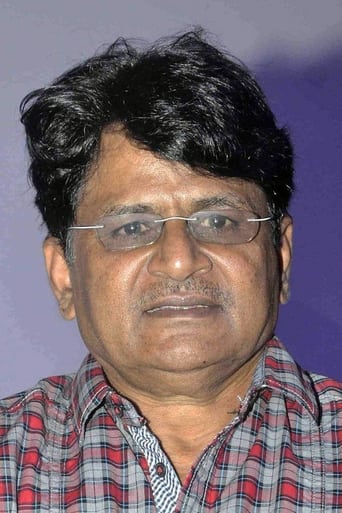SnoReptilePlenty
Memorable, crazy movie
SanEat
A film with more than the usual spoiler issues. Talking about it in any detail feels akin to handing you a gift-wrapped present and saying, "I hope you like it -- It's a thriller about a diabolical secret experiment."
Allison Davies
The film never slows down or bores, plunging from one harrowing sequence to the next.
sydneyswesternsuburbs
Director Shekhar Kapur has created a gem in Bandit Queen.Starring Seema Biswas who has also been in another classic bollywood flick, Company 2002.Also starring Nirmal Pandey.Also starring Rajesh Vivek.Also starring Raghuvir Yadav who has also been in another classic bollywood flick, Salaam Bombay! 1988.I enjoyed the violence.If you enjoyed this as much as I did then check out other classic Bollywood flicks, The Attacks of 26/11 2013, Rakhta Charitra 2010, Rakhta Charitra 2 2010, Nh10 2015, Madras Café 2013, Black Friday 2004, D-Day 2013, Gangs of Wasseypur Parts 1 & 2 2012 and Shootout at Lokhandwala 2007.Also check out a classic Lollywood flick, Waar 2013.
johnnyboyz
The process of realising just how lacking in any sort of grace or overall substance Shekhar Kapur's 1994 film Bandit Queen actually has comes at us as quite a surprise; the film, a grubby little piece dressed up (what with its being in a foreign language, arriving with British funding as well as the cinematic pretenses it purveys throughout) is actually little more than a troublesome rape-'n'-revenge movie duly arriving with a less than subtle feminist tract, is often a trite and dull affair. The film is a mostly empty experience depicting the life of a specific woman whose experiences were anything but devoid of nastiness; a misjudged project often resembling what something like Badlands may have looked like had it been made by Lucio Fulci; an odd spin on the narrative you might find in something like Day of the Woman, a film depicting the odd splash of sexualised violence before the striking back against the state and such begin. The film doesn't know whether it's glorifying bloody revenge; demonising a monstrous ruling state, bloody revenge or glorifying the politics of those in charge. Amidst all the troublesome content, Kapur's decision to round things off with an attempt to create some sort of Gandhi-esque figure out of its lead is just deeply problematic in itself.The film covers a young woman from the ages of eleven to around twenty five. Her name is Phoolan Devi (Biswas), a true to life figure of politics and woman's rights whose plight of abuse and marginalism are here depicted in a nation one is perhaps partial to expecting to be more rife within that of a predominantly Islamic state rather than India. One of the more terrifying things about the film is the fact it unfolds at a time when the 1970s was crossing over into the 1980s, when the attitudes and mentalities depicted therein strike us as more along the lines of what might've occurred in relation to all this stuff as the 1870s crossed over into the 1880s. On top of these ground floor ideas, the film additionally possesses the dusty, swooping sub-continental vistas in its armory: we hope all combining to set up an engaging, taut piece that looks good and comes with a healthy chunk of cinematic substance.Alas, this is not the case. When we start with Devi's life, we begin with young Phoolan in a small stretch of water as an infant, the film offering very little in the form of respite in its documenting of this girl being put through the wringer as it is here in this very first scene a gentleman arrives in search of a bride to be. The girl is called out of the water, clean and cleansed and ready to begin a new life afresh; a sort of metaphorical rebirthing as she wonders out of the fluid ridden pool with an immediate view to leave behind everything in life up to this point, and begin a new one rife which will come to be epitomised by marginalisation and sexism. The film goes on to cover her falling in with a group of bandits when the angered rejection of this man's advances out of sexualised motivated purposes, and the consequent rejection from her home village when she escapes back to it, sees her join up with an amoral group of thugs whose way of life is what it is; Kapur here neatly highlighting the irony lying with the fact her village banishment was down to accusations of indulging in such behavior that eventually leads on to such behavior.The presence of Vikram (Siraswal) is the film's next point of interest, an unrealistic poster boy amidst the other bandits and apparent leader of this ragtag gang whom comes to form a makeshift partner for the lead. Vikram's presence is equally problematic, a male character in the film where there need not be one; a male character who steps in and acts as a physical manifestation of where Phoolan herself should be breaking through transgressive barriers. Annoyingly, his role is to save her from the periodic attempts of rape brought about by that of the other bandits before dictating to her the rules of survival. This verbal confirmation, of what should have been established visually, pertaining to being what the lead herself should have already learnt, is a disappointing inclusion; this relying on an otherwise unnecessary male presence to inform the woman on how to get by, when the pretenses are that Bandit Queen is a piece documenting the harsh realisations a woman goes through when cut loose by a society that rejects her, equally so.The film falls short: a one part-exploitation flick; one part eyebrows down, brow furrowed and hands clenched together beneath one's chin as if studying a chess position piece begging for some sort of contemplation. It wasn't scuzzy enough to be the former and not interesting enough to be the latter, while there is little therein for it to argue itself to be a political text on gender equality in the nation of India. With the sorts of more recent films coming out of this part of the world (namely Iran), one can skip this particular piece and jump to said texts without missing too much.
Chrysanthepop
'Bandit Queen' was one of Shekhar Kapur's final films before he ventured into Hollywood. Due to its subject matter and very graphic portrayal of rape and humiliation it was considered to be one of the most controversial Indian films and was even banned in the country. The film tells the story of Phoolan Devi in her earlier years (before she became a politician). Even though the film is said to be based on accounts written by Devi, the Bandit Queen herself was disappointed by the film and stated that it was riddled with inaccuracies.Like most of Kapur's movies, the execution is first rate. The raw dry landscape is captured stunningly. It looks beautiful but at the same time very real. The art direction also brings out an authentic earthy quality of the village and its dwellers. The narrative structure and cinematography are solid and the pace is well.The rape scenes are disturbing, especially the gang-rape and the scene that follows where humiliated Phoolan Devi is stripped off her clothing and exploited in the village by her assailants. The sequence provides shock value but not in a gratuitous way.'Bandit Queen' has some remarkable performances. Nirmal Pandey, Saurabh Shukla and Manoj Bajpai are excellent. Govind Namdeo is chilling and hateful in one of his sleaziest roles to date. However, this is Seema Biswas's film. The actress performs all guns blazing in this career defining role. She wonderfully moulds feistiness, vulnerability, anguish, despair and strength in her character. It has me wondering why she hasn't received more of such meaty roles.I can't comment on how much of it is based on what really happened but 'Bandit Queen' is an exceptionally well made film that tells a harrowing story of a crucial figure.
gulshan-1
Dark,ferocious and creepy. This controversial piece of Indian folk still freaks me out! Well directed by the talented Shekhar Kapur to give us a break from the nonsensical bollywood flicks. Seema Biswas gives a very electrifying performance who remarkably portrayed the true femme-fatale of those days although, I am still curious on the essence which depicted all the anguish and the immorality which lead the struggle to the queens personal justice. However,whether the contents are based on facts or fiction, the film manages to deliver a strong meaning to feminism power. This is a must-see film. Powerful score by Nusrat Fateh Ali Khan also adds to the ingredient. "Bravo!"





